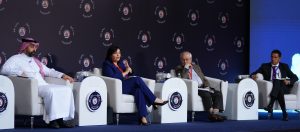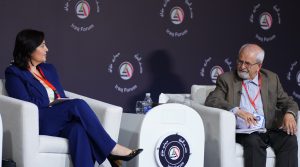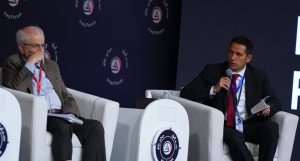- Maha Yahya, Director of Carnegie Middle East Centre, Lebanon
- Dr. Sayed Kazim Sajjadpour, Institute for Political and International Studies, Iran
- Dr. Hisham Al-Ghannam, Naif Arab University for Security Sciences, Saudi Arabia
- Bilgay Duman, ORSAM, Turkey
- Hafsa Halawa, Academic (Moderator)
Iraq’s Prime Minister has repeatedly stressed his desire for Iraq to engage with the international community and pursue good relations with its neighbours based on national interests, with several high-profile diplomatic visits already in 2023. Iraq has important neighbours with diverse political, natural, demographic and cultural dynamics. Engagement between these neighbours has not always been straightforward, and ranged from harmonious partnerships to rivalries, conflicts and wars. Policies adopted by Iraq’s neighbours have had a direct impact on the country’s stability, and vice versa.
Despite the relative calm and bilateral diplomatic relations of present, tensions remain on the security, political and environmental fronts. There is potential for mutually rewarding trade, economic, energy, tourism and cultural relations between the region’s countries, and in this panel, foreign policy experts took a look at Iraq’s current role in the Middle East, discussing the regional dynamics and proposing methods for improving relations among actors, with a focus on the national strategies of Iraq and its partners to make the most of the available goodwill and business opportunities.
According to Hisham Al-Ghannam, from Naif Arab University for Security Sciences in Saudi Arabia, “The region is on the verge of moving towards good governance, where domestic politics is the main driver of foreign policy, and this applies to all. The region is overwhelmed with problems. What happened between Saudi Arabia and Iran is more than a truce, it is a path of normalization that can lead us to a path of comprehensive normalization and agreement, leading to the closure of several important files, and the countries of the region must deal with them.” .. “Western countries are no longer the main customers of the region and this must be taken into account. These countries [of the region] have realized that they no longer have the freedom to align with one force against another.” The internal issues are pressurising all. “State-building should take priority in these countries of the region.” He stressed that the Saudi-Iranian movement is an opportunity, which everyone should seize. The goal of Saudi Arabia is to have a regional agreement before there is an international settlement and for these countries to stabilize. This is important for Saudi Arabia.

Speaking on the Iraq-Iran relationship, Sayed Kazim Sajjadpour from the Institute for Political and International Studies in Tehran told the audience that, “Our destiny is the same… any delusion that Arabs are versus Iranians is not correct.” Pointing to the Persian language, Sajjadpour said the countries’ culture and history are intertwined. “60% of our words are Arabic. We are so close,” he said. There is “around 11 billion dollars of interaction” between Iran and Iraq, he added. “Now it [the Iran-Iraq relationship] is about the economy and regional interactions… We should understand each other on a common base – more understanding rather than division. Everything is manageable,” he said. “Iran borders all parts of Iraq,” he continued, but said the other point is deeper. “It is about deep relationships between each of us. We don’t want Saddam Hussein’s rule to be repeated, we don’t want ISIS to be repeated… We want the relationship to be improved and preserved. I think the Iranian–Saudi relationship will make the context better. Iraq stands tall, and we will manage [our relations] better,” he said.
Maha Yahya, the Director of the Carnegie Middle East Centre, described the Saudi-Iranian détente as a good development with a great impact on the region as a whole, including Iraq. She spoke on the role of Syria in the region, discussing recent efforts to restore the country to the Arab League, and the country’s engagement with Iraq. In Syria, there is an interesting dynamic, that tries to bring back Syria to the Arab sphere. “Some have billed this as an attempt to distance Syria’s from Iran… this is not new and has gone back decades,” she said, referring to the entrenchment between Syria and Iran which reflects a deep relationship in political, economic and socia sectors. It is a state-to-state relationship as well as other actors involved. The biggest challenge is to get the Syrian government and its President to offer compromises and achieve a lasting peace, conditional on the return of refugees. Nevertheless, there is an opportunity to work together to achieve stability. On Lebanon, the country is facing a harsh economic hardship and it is disintegrating meanwhile. There is a void in the country, electing a President is still a problem. Iran has a big influence on these political actors. Where she saw things going is that the complicated dynamics will continue. The country needs structural reforms in the economic and political system.

“Iraq is one of the most important countries for Turkey,” Bilgay Duman told the audience. “Turkey wants to extend relations with Baghdad,” he said. “Things will not change; Turkey is benefitting from the Iraqi democracy and sovereignty… Turkey is not against Kurds and not against Iraq. Turkey is part of the international coalition against Daesh. When Turkey makes operations against the PKK, Turkey is helping to keep Iraqi sovereignty,” Duman said, acknowledging that Turkish operations in the Kurdistan Region of Iraq “could be expanded to Tal Afar, Kirkuk, and Sulaymaniyah.”
Asked by Halawa about the strategic role of Turkey as a NATO ally and also in Iraq – essentially wondering what Turkey’s end goal is, Duman said all issues were connected. “Iraq is a major country in the Middle East, Gulf policy is very important. Turkey wants to establish relations in Iraq. Turkey and Iraq established a strategic dialogue in 2008, the first dialogue in the region. Of course, we have many differences… [but] each time, Turkey sought to build better relations, especially in the energy sector,” he said, giving the example of PM Al-Sudani’s recent visit to Turkey, to discuss water issues. “Both sides wanted to agree on their own issues, support their own issues,” he said, mentioning the dry canal project which aims to reach from Basra to Turkey to Europe. “There will be further opportunities for partnership,” he told the audience. “This will also have a positive impact on the Erbil-Baghdad relationship and prove to investors that Turkey wants to build and improve its relationship with Baghdad.”
Questioned on whether the presence of the west and international community in the region promotes some kind of regional competition, and how the region might continue to engage without the so-called buffer, with an absent and weaker US, Yahya told the audience that it is not a zero-sum game. “We don’t want ISIS in the region, but … the question of inclusion becomes incredibly important. ISIS emerged in part because of exclusion and sectarian exclusion in Sunni areas… [The majority of people who were displaced or forced out of their homes in Syria were Sunnis], therefore there is a bit of a disconnect between the deal and the way it is being perceived on the ground. There is a sense and a worry that for a large percentage of the population that they are being left out.”

The rapprochement between Iran and Saudi Arabia is the beginning of the way to address this, she added, but caveated that this does not mean that one side has won over the other. “In Lebanon, the sense that the national priorities and interest in Lebanon are often trumped in the broader strategic image of the region, no matter what its own interests are, poses a genuine challenge to the country,’ she warned. “In terms of the international community, the US has not left the region and has realigned its strategic vision,” Yahya added. “Its historic allies are no longer siding with the United States, and they are prioritising their own interests. “Of course, the US still has a military presence and an economic interest and presence, and these things cannot be discounted… When it comes to witnessing significant conflict, the international community has a big role to play.” Any political settlement requires financial support and addressing issues such as refugee resettlement. On Palestine, Yahya says the international community’s support is vital, as the situation will continue in the absence of a just solution without their support.
“Expectation management is our theory,” Hisham Al-Ghannam added. “What happened in the UAE and Bahrain hasn’t impacted the relationships between the Gulf states… We could not imagine such a thing even ten years ago,” he told the audience. “What happened between Saudi and Iran is more than a truce, it is the beginning of a comprehensive normalisation. The Kingdom of Saudi Arabia had a challenge, and it is working towards stabilisation,” he explained. “Green energy too, and our natural resources will be less and less… Saudia cannot move and act too slow. Of course, we need to introduce good governance, and America is a key player,” he acknowledged. “China means something different.”
Iraq Forum: For Stability and Prosperity
4/05/2023
Session 6: Iraq in the Middle East: Zero-Problem with Neighbours
Session video

